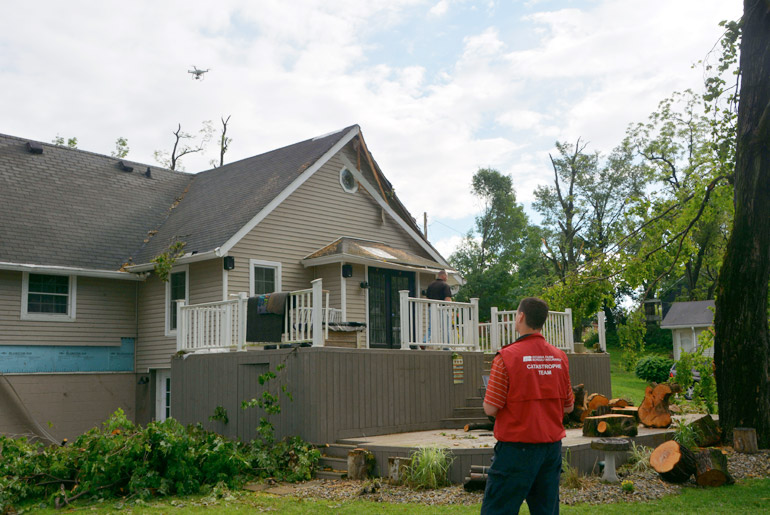
The beginning of the spring season also means the start of another season—storm season. Storms can and have happened during any month in the state of Indiana, but we need to be extra cautious from April through August. The threat of storm
season is certainly something to be mindful of.
Here are a few of many helpful tips and tricks to prepare you for storm season and keep your home, loved ones and yourself safe from the unpredictable.
A common scene after a major
storm, tornado or other disaster is branches, leaves and trees all over roads, lawns, or even worse—on your home. We hope that none of these situations happen to you, but in some cases it is smart to prepare for the worst. To prevent branches,
leaves and trees from destroying your property, consider trimming the trees around your property and cutting down trees that pose a potential threat to you or your home
.jpg?sfvrsn=f6ce24ba_1)
Last summer, I had the opportunity to go on a claims ride-along after a tornado touchdown. There had just been a storm that caused major damage throughout the city of Pendleton. One thing I noticed while looking at the homes that had been damaged, shifted
or demolished, was the condition of the yards themselves. You should be mindful of what you have in your yard and understand that during an unexpected weather event, these items could blow away, cause additional damage to your home or cause
damage to others’ homes.
.jpg?sfvrsn=95ce24ba_1)
Another way to prepare is to check that you have an emergency or disaster kit on hand. Although a good disaster kit can have a large assortment of items inside, there are some things you’ll want to be sure to include. Here is a list of suggested
items you will want in the kit:
- Water
- Food
- First aid kit
- Cell phone charging cords/external chargers
- Fire starter
- Crank or battery-powered radio
- Flashlight and extra batteries
- Cash
- Change of clothing
A back-up generator is something to put on your preparation to-do list. A generator can help keep the power going in the event of a major power outage. It is important to do your research prior to buying a generator; there are a lot of different types
in multiple different price ranges that you will find. So before buying, do your research and understand why you may need one and how it will help in the case of an emergency.
Flashlights and extra batteries are a must. When I was younger,
I recall when there was a major storm and it would result in a power outage at my house. The lack of power resulted in very little to no toilet flushes, my mom yelling not to open the fridge and sleepovers in my parents’ room. Something we always
had on hand were these thick, yellow flashlights. It was really my grandfather that would buy them for us. My siblings and I always wanted to play with them when there was not a power outage, but minutes after playing with the flashlights we would
hear my mom yell to turn them off. The moral of the story is to always have multiple flashlights on hand as well as extra batteries, but to also inform your kids on why you may need the flashlights in the future.
Prior to the unexpected,
contact an Indiana Farm Bureau Insurance agent to learn your insurance coverage options. Make sure your policy coverage fits your needs and covers your important assets if a storm, tornado or another natural disaster does occur. Although having coverage
in place may help decrease the personal financial costs from severe weather, it does not stop the damage entirely.
It is critical to understand what your next steps are if a storm hits. Some questions you may be asking when the unexpected
happens include who I need to contact and what to do..
One of our community partners, American Red Cross, knows a little about staying safe
before and after a storm hits. Together we developed a booklet that includes important steps for a safe and speedy recovery. Although we want to prepare for the worst, sadly sometimes the worst happens. So, we want you to know what you need to do
after the disaster happens. Here is a short list of things you and your family needs to do immediately after the storm hits.
- Check the area around you for hazards
- Have injuries treated by a medical professional
- Remain calm
- Avoid driving during the immediate post-disaster period
Our friends at Kentucky Farm Bureau also understand that the unpredictable does happen, but they are aware you may not know exactly what to do after a storm hits. So, read more about what Kentucky Farm Bureau’s blog, Life’s Blueprints, says about the protocol for after the storm hits.
Inside Story is for educational and informational
purposes only. Inside Story is compiled from various sources, which may or may not
be affiliated with our family of companies, and may include the assistance of
artificial intelligence. While we strive to provide accurate and reliable
content, we make no warranties or guarantees about its completeness, accuracy,
or reliability, and are not responsible for the content of any third-party
sources or websites referenced herein. The inclusion of any content does not
establish a business relationship or constitute our endorsement, approval, or
recommendation of any third party. Testimonials and examples provided are for
illustrative purposes only and do not guarantee future or similar results or
outcomes, and may not consider individual circumstances, goals, needs, or
objectives. Inside Story does not provide legal, tax, or accounting advice. For
individual guidance, please consult a qualified professional in the appropriate
field.
Coverages
subject to policy terms, conditions, and exclusions. Subject to underwriting
review and approval.